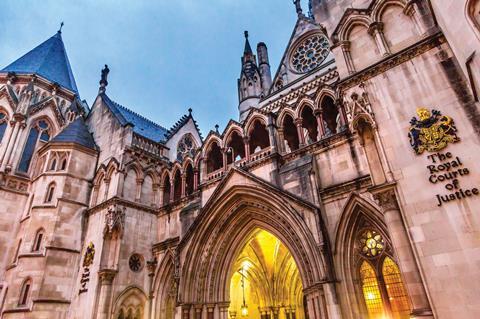A legal business owner broke the law by conducting unauthorised litigation - but was not in contempt of court, the High Court has found.
In Baxter v Doble & Anor, Sarah Doble and her Somerset-based company faced a contempt application brought by a party in possession proceedings who claimed that the conduct of litigation against him breached the Legal Services Act 2007.
Mr Justice Cavanagh found the respondents had indeed conducted litigation on behalf of client James Persey for six months in 2019 - but accepted Doble’s defence that she did not know an offence was being committed.
‘It is true that Mrs Doble’s belief that she and [her company] were not conducting litigation for Mr Persey was wrong,’ said the judge. ‘However, this does not necessarily mean that she could reasonably have been expected to know that she was conducting litigation.’
Cavanagh said the court needed to identify where to draw the line between reserved legal activities including litigation, and legal activities that may be performed by unregulated lawyers.
The central question, he said, was to answer what was meant by the ‘commencement, prosecution and defence of proceedings’.
The case has wide-ranging potential consequences, getting to the heart of issues around reserved activities and the role of unauthorised providers. The Law Society, legal ombudsman and CILEX Regulation were all invited to make representations on the matter, giving an indication of the importance of the case to practitioners.
The court heard that, in the possession proceedings, Doble and her company drafted the claim form and particulars of claim, checked the bundle to be sent to the court, posted the claim form, particulars of claims, enclosures and cover letter. Dobie also paid the £355 court fee from the client account and ensured that documents were drafted and filed in line with civil procedure rules.

But the company had not gone on the record as representatives of Persey, had not signed the claim form or particulars of truth and had not used the online claims process. In addition, the company’s letterhead had not been used for the cover letter.
Cavanagh said the actions of Doble and her company, both in relation to the claim form and particulars of claim and in relation to a reply and defence to counterclaim, amounted to the conduct of litigation, and so related to reserved legal activities under the 2007 act.
Doble and her company went ‘far beyond’ clerical or mechanical help, giving ‘full assistance’ to Persey, including drafting all the documents required, instructing counsel, making a court payment and corresponding with the other side.
The judge said: ‘The only difference in this case from that which a solicitor or other authorised person would have done is that the respondents did not formally go on the record or use their own notepaper for covering letters when dealing with the court.’
But, on the question on intent, the judge said Doble ‘did not believe for a moment’ that she was committing an offence. She was an ‘entirely truthful witness’ who had tweaked her business model to try to be compliant and had genuinely believed that she was not conducting litigation.
The judge added that the law was ‘unclear’ on this subject and the statutory wording ‘did not give any clear steer’ about whether particular advice or assistance was litigation. In particular, the words ‘prosecution of proceedings’ were vague and uncertain. The authorities offered little guidance.
The court heard that Doble had previously been investigated by CILEX Regulation over concerns that her website referred to her previous work as a property litigator. It was further found that she sent letters to the court with her company letterhead and used phrases such as ‘act for’ and ‘by way of service’ in correspondence. She changed these practices following legal advice, but was given a formal warning in 2017 from the regulator.
This article is now closed for comment.



























9 Readers' comments